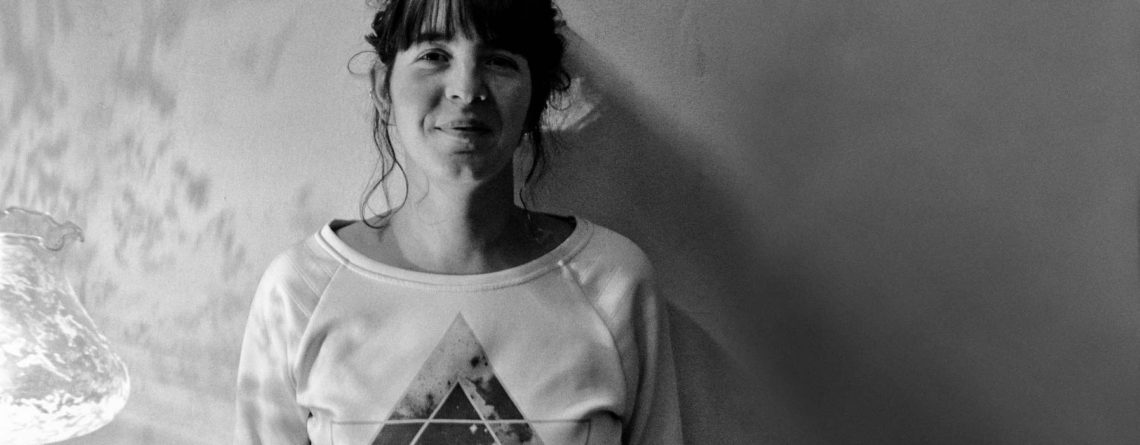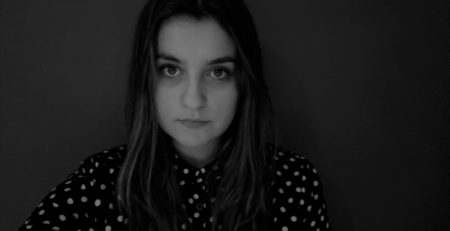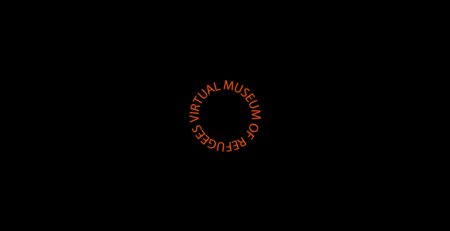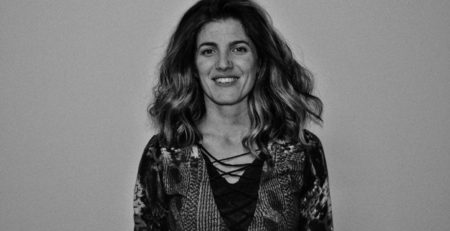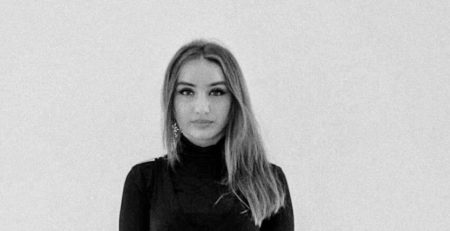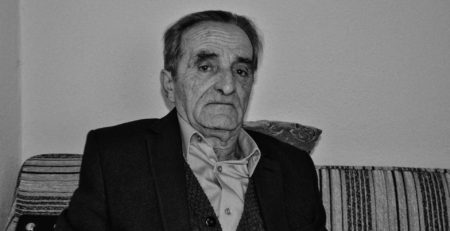Nita Zeqiri
Bjeshka Guri (interviewer)
Nita Zeqiri (interviewee)
Acronyms: BG=Bjeshka Guri, NZ-Nita Zeqiri
BG: Tell us something briefly about yourself.
NZ: I am Nita Zeqiri. I am a photographer mostly, and filmmaker a bit. At the same time I deal with youth empowering.
BG: Can you tell us something about the war and the overall situation at the time? Your first memories.
NZ: I was 9-10 years old when the war started in Kosovo. At the time I was living in northern Mitrovica with my family. I don’t know. Perhaps, for me, it was a period when I could not quite understand very well what was happening due to my age. But I was frequently informed because I used to go and buy the newspaper and bread in the morning, and on my way back home I always used to read the newspaper sneaking from my parent, and I learned about everything that was going on, when a murder happened in Mitrovica or other regions. That was my source of information because my parents did not want to expose me to the news about what was happening in other Kosovo regions. In a way, what was happening followed my in a secret way.
BG: How did reading about all those events make you feel? What did you think about the war?
NZ: As I said, I probably did not understand it very well. For me it was just access to a source of information that I was being denied. Yet, it was a very discussed topic at the time, both at home and in school. We were always afraid when we went to school since there were more Serbs in northern Mitrovica, and I went to “Sami Bekteshi” school in the south. My brother and I had to always stay together especially before the bombing, and always go straight home after school. This was something you could notice. You could not go out in the neighborhood to play either. These were some prohibitions you faced everyday. You stayed at home as much as possible, and you had to be careful or not take at school the history book or the Albanian language book because there were many cases when the police stopped children and took their books or maltreated them, or even hurt them, you know. So this was the fear, more or less, of that age when you did not know what was happening but at the same time you did. You knew about the war but you did not know what it meant, what it comprises, what it includes. A sort of fear, sort of internal mystery, but you still tried to have fun in other ways, by playing Nintendo, doing something else, or drawing, but at the same time trying to watch the news. For me that was very important; whenever I had the chance I listened to the news at home or read the newspaper.
BG: When did you realize that you had to leave?
NZ: It was March 22 when the bombings started, if I am not wrong, yes March 22. That day, my grandparents, my uncle and his wife and little son came to our house where we used to live, it was a rented house, since there were too many Serbs in the building where they lived and it was a bit dangerous. We stayed there for two days and then my parents, who were also activists, noticed the situation and realized that they might come after them to arrest them or kill them. They probably contacted other activists who suggested they leave the house. Then we went to Tavnik neighborhood in Mitrovica where there were more Albanians, it was safer than the part where we lived in the house. So, that was our first move. It was very chaotic and there were many people in the house which was unusual for us to have someone other than our close family living with us. During those days a murder was committed in Mitrovica; an activist and his son were killed. The latter was my brother’s best friend. Again, of course, my parents, my grandparents and my uncle did not want us to find out but I found out because I was always trying to learn about what was going on. I felt really bad about my brother, but at the same time I kept it a secret from him too. That was a moment of maturing because I considered that I was trying to protect my brother. It was very chaotic. My family tried to keep some basic things and which were more valuable to them, like jewelry and documents. We went to Tavnik and that day I had my menstrual cycle, probably also because of the stress, after hearing the news and being really sad, which then followed my during the entire journey while we were out of home, which lasted about three weeks. We went to Tavnik. We stayed there for a few days at some people that we knew. Then it was dangerous to stay there maybe also because my parents were activists. There were many persons who informed the Serbs about who was staying where. So we went to a village close to Mitrovica, called Shabar, at my grandfather’s friend. We stayed there for 5 days, I think, if I am not wrong. But there were too many people in that house: there were children, women, men. But they were divided: men used to stay in one place, women in another. And, we never used to have such a division in our family. I faced this gender division for the first time and it disturbed me a lot. I used to go where the men were staying to listen to the news. I think that is where I had complete freedom because no one stopped me. My mum too used to come there. But she was more involved in other things so she listened to the news. There were other children there. It was a very cold atmosphere because soldiers used to come occasionally. At some point they came at the wall and we saw them very closely. But, I do not know, I did not consider that situation as dangerous. Maybe it is a matter of age since you cannot comprehend things well. But I was sad about my grandmother all the time, i.e. my mum’s mother, who lived alone in the north, and I want to go to her all the time, to see her and take her with me. That was my main concern during the whole war time in Kosovo, to visit her, take her with us, not leave her alone. That was my main aim. After that I do not remember too much. I do not know why this part is a bit erased from my memory. I do not know how we decided to go but there was a situation when they wanted to…I mean, there were people giving different opinions: that men and women should separate, and my parents decided not to do this. Then everyone who was there divided, about 30-40 persons. They survived then because it was some kind of manipulation…
BG: What was the reason of separating?
NZ: I do not know exactly but I think the reason was for men to be saved, they did not hurt women, and because men were supposedly not safe there. But this did not happen and after that we continued our journey to go to Macedonia. We returned again to Mitrovica, if I am not wrong. Yes, we stayed in that same house, several persons sleeping in the same room. Then we decided to separate. We, the close family, my grandparents, my uncle with his wife and son, decided to go to Skopje. We got on a bus. I know I cried the whole time because my grandmother was left alone in Mitrovica. I had a very close relationship with her. I know that we were all scared, the entire bus. You could feel the fear in everyone because we saw many paramilitaries on the roads, many houses being burned. These are the things I remember, but I cried so much that I could not see all the bad things happening because I was a child. It was also the fear of stopping the men. My uncle and mu dad are really tall and they were suggested to “sit lower so that they cannot notice you and send you back” which happened to other men: “You, get out!” and they never came back. When we arrived at the border and then at Hani i Elezit, the line of cars was really long, waiting to cross the border. The bus left us there. Then we started walking. It was again very stressful but we were kids and did understand it well. Sometimes, when you stop and think about it, that situation would be experienced a lot more differently had you been an adult. Then we went closer. We saw many empty cars. They say that people left their cars and crossed the border on foot. Then we saw an empty car. There were many other cars. We got in a car. We separated, as many as we could fit in a car. That was the first experience of having a car at home, for 2-3 days if I am not wrong. We stayed there, we slept in the car, my parents, my brother and I. Sometimes humanitarian aid used to come and bring us food, which was too little. I remember that my dad was lost there. A mini bus came in the border between Macedonia and Kosovo, and we approached it. It was a terrible situation. We did not have anything at all. And the weather was really cold, it rained the whole time, it was foggy. We stayed there for 2-3 days and then we decided to cross the border. We approached the border, and there were too many police officers. My mum was the one who went to talk to them, to tell them that we want to cross the border, we want to go to Macedonia. We were really scared at that point because we knew that if you approach them you might not return anymore, they can kill you. Maybe that was when I grasped the situation. I just felt that that was it. But then my mum came back, and I saw her as a heroine “Wow! She saved all of us!” And so they let us cross the border. It was very, very strange how they let us go. Two other families came then, telling us: “come with us”, they were probably in a good mood and did not care. So they let us all pass, two other families as well, and we crossed the border and it was a very…I do not remember a lot, I blacked out. I do not remember these details. Then there were those who took care of the camps. They sent us to the Stankovac camp. We stayed for 2 or 3 days there in a tent. Different organizations sent people abroad from there. They asked them whether they had any relatives abroad and in what country, so that they could have family and emotional support from their relatives. We decided to go to Germany and England. My uncles were there. We had a lot of freedom there. We used to go out with my brother, walk, play. But we again stayed in a tent with other people, 8-9 all of us in a tent. You could hear them snore, and as a child, that was really annoying. But it was still nice. Then, while walking around with my brother, we met our piano teacher from our musical school, and she was really surprised. She said “What are you doing here?” And, we told her that we were refugees, like everyone else. She was working with OSCE or UN which were helping refugees at the time and she helped process our request faster, and then we only stayed there for three days. Then we got on a bus. That was an experience that I can never forget. Again, that short joy passed. The concern of my grandmother was again what followed me the whole time, I was sad that she was not with us. We got on a bus, and we waited for a long time until everyone was ready to leave. There was a photographer there who wanted to take a picture of me, and she really annoyed me. That is really bad because I am a photographer myself. And, often times, when I am taking pictures, I think of her, especially about how you make people feel, because it was very important to document that moment but for me it was not more important than my situation, I just wanted to be left alone. She tried several times. I was sitting on the stairs. I noticed that she wanted to take a picture of me and I went and sat on the chair. She came again at the chair. I would really like to meet her and talk to her, but I do not know who she is. Then they took us to the airport. We went to Frankfurt. We landed and it was very interesting because CNN was live giving news. Many relatives of ours who did not know where we were since we could not call them, had been watching the news and then found out that we were alive. That was then a funny story that followed us the whole time. Then we want to a town, whose name I cannot remember, but they were like “heims”, or refugee camps. We stayed there for a day or two. I remember that the people of that town organized a welcome party, they cooked food, I ate the best cake in the world, I still remember that taste. Then they sent us to do some shopping, to buy clothes because we had been wearing the same clothes for two weeks, and we had not had even a place to shower. I was on my periods the entire time, and when we went there, we rested for a while I think, my periods stopped. Then they sent us to a small town close to Frankfurt. We were again placed in “heims”, collective houses where refugees used to live. There we met different refugees, from Bosnia, from Africa, and other countries and continents. But we could not talk to them a lot, I spoke only a little English, some basic things. We also met Albanians who had gone there and did not do anything just continued to live there. Then there was a different system. We had our own apartment where we lived. It was a different system of living, and individual life with only four people from living with many people. It was much better there. After a short period of time, I cannot recall how much, our parents sent us to school. Just to socialize. The school principal was very nice, very positive, and he immediately allowed us to attend that school although we could not speak the language, solely for us to socialize with our peers. I was enrolled in grade 7, and my brother, who was 2 years younger than me, also came to the same cgrade as me. We both went to grade 7. All the other children were German, very kind. Our tutor was quite Nazi. She did not have another choice but to accept us because she did not like us at all. Otherwise the other teachers were really nice, they tried to make us feel at home, taught us German. We used to participate in theatre classes, sports’ classes, those classes where the language was obligatorily involved.
BG: Did you have any news from Kosovo?
NZ: We did. We bought the newspaper everyday. We did not have a TV but we could buy Koha Ditore and Bota Sot, I am not sure, every day. That was what followed us every day. The feeling of wanting to know what was happening to the people, to my grandmother because we had little contact since the communication lines did not work that well or they had been cut in many areas. I remember once when they commemorated my brother’s friend in the newspaper. My granparents and my parents noticed it, and they cut it so that they could isolate my brother from that news, we tried to disappear it from my brother. Many people and relatives came to visit us but there was always the concern about what was going on with the other relatives, with Kosovo. We watched news on TV whenever we could, otherwise the newspaper was the main source of information the entire time. Then we went to visit my uncles, and this was an opportunity to watch the news and learn about the situation.
BG: When did you decide to come back? Did you stay there for too long?
NZ: In Germany we stayed for three months. Mainly probably two and a half months. We went to school, which was a period that kept you out of the things going on. I had a crush in class. Those were the factors that show that you were socializing with others. It was also the first time I encountered suicide maybe because there was a…There was a train station close to where we lived, and I had a moment of emotional explosion. I told my parents I want to get on a train and go to Kosovo to save my grandmother. But this was also to escape that feeling that followed you even though you had fun, had a crush, or made friends. The feeling of…how do I say this…you were…”hanging”, dependent on the situation of what was happening to your people. Then, after 3 months, when the war was over when NATO came to Kosovo, my dad first came here to see what the situation was like. The first thing he did was visit my grandmother and then he called us, and that was such a great joy, incredible. Then we had to go through the administrative procedures to inform them that we wanted to return to Kosovo. And the first plane that came back to Kosovo with refugees, we were in it too. Very brave, extremely brave. We had bought some newspapers to read on the plane. We thought that everything would be just great. You did not think about – obviously because you were a kid – about the bad things that had happened; you just thought that everything is now okay. So, we came back after three months, first in Sllatine then we went to Mitrovica. And, that is when our “dream” that everything was okay shattered because we saw many houses that had been completely burned. I remember something while we were in the bus because many people shared their experiences. There were many burned houses but their chimneys had not been burned and I remember this very well, I don’t know why. They used to say that when the chimneys are not burned that is a symbol of victory. We won, see? The houses have been burned but not the chimneys. Interesting. Then we went to Mitrovica. Of course, we could not go to the northern part due to the situation that continued. We stayed in the south in an apartment, and this is how it continued for me. Like for everyone else who lived in Mitrovica, this was a continuation of the war. There were protests. My parents used to go to work in the north since they are doctors. And we continued to be afraid that something would happen to them, because they were attacked very often, and the feeling of not being in complete freedom persisted, along with other problems.
BG: How did it affect you emotionally, facing various situations when you noticed that it is a result of the trauma?
NZ: I don’t know. Maybe because, as I said, I was a child, they did affect me, but I might not be completely aware of the traces they left in my life. I mean, all those experiences did have a large contribution, regardless that someone might call them big, someone small, depending on their experiences. But, for me, I think it contributed a lot to my emotional state. Yes, definitively, because I think, as a nation, we have refrained formulating about the war and it was that euphoria, if I could say so, not to talk too much about it. We shared stories but gradually people…I have frequently been in environments where the topic of war was opened and they did not want to continue talking about because it made them feel bad, and suppressing it was the best way of protecting oneself. Now, I very rarely hear people talking about the war, unless you are at a theatre show, exhibition or movie, which will always open the debate on the war if such is the topic.

